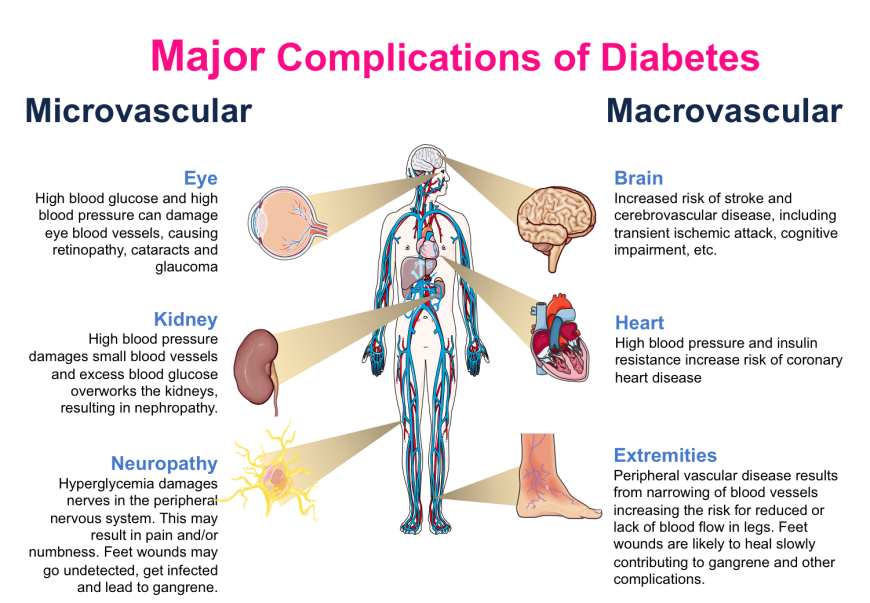The 15-Second Trick For Florida Best Cardiologist
Table of ContentsAll about Cardiologist In LeesburgSome Known Facts About Florida Female Cardiologist.The Only Guide to Heart InstituteHeart Specialist Near Me Can Be Fun For AnyoneAll About Best Cardiologist In Leesburg, Fl
Clinical trials look at new ways to prevent, detect, or treat disease. Researchers also use clinical trials to look at other aspects of care, such as improving the quality of life for people with chronic illnesses. Find out if clinical trials are right for you. Clinical trials that are currently open and are recruiting can be viewed at www.ClinicalTrials.gov.The circulatory system is responsible for the delivery of blood, and therefore glucose in the blood, round the body. The different complications of diabetes are a consequence of damage to blood vessels in different parts of the circulatory system. The circulatory system is essentially the body infrastructure, providing the route ways for the blood to transport oxygen, nutrients and hormones to and from the cells and organs.
Blood vessels range in size, from larger arteries into very small blood vessels called capillaries. Capillaries feed into the veins which carry blood back to the heart. The circulatory system performs a number of roles, including: Delivering oxygen and nutrients, including glucose, to the body’s cells Carrying carbon dioxide and waste products away from the cells Transporting hormones and therefore helping the body communicate with its organs Transport white blood cells to fight off infection Regulating body temperature The circulatory system allows blood glucose levels to be regulated.
The Single Strategy To Use For Heart Doctor
If blood glucose levels become too high for extended periods of time, damage can be sustained by the blood vessels. If significant numbers of blood vessels are damaged, this can have a negative effect on the functioning of the body. Where damage is sustained to a significant number of blood vessels in a certain area of the body, diabetic complications will develop.
Damage to circulation and the nerves in the foot and legs can increase the risks of developing foot ulcers and could lead to amputation. When blood vessels feeding organs are damaged, this can affect performance of the organ. When the kidneys are damaged in this way, they lose their effectiveness in filtering the blood (cardiovascular institute).
The following statistics speak loud and clear that there is a strong correlation between cardiovascular disease (CVD) and diabetes. At least 68 percent of people age 65 or older with diabetes die from some form of heart disease; and 16% die of stroke. Adults with diabetes are two to four times more likely to die from heart disease than adults without diabetes.
Top Guidelines Of Florida Cardiologist
 Diabetes is treatable, but even when glucose levels are under control it greatly increases the risk of heart disease and stroke. That's because people with diabetes, particularly type 2 diabetes, may have the following conditions that contribute to their risk for developing cardiovascular disease. cardiologist in Leesburg. High blood pressure has long been recognized as a major risk factor for cardiovascular disease.
Diabetes is treatable, but even when glucose levels are under control it greatly increases the risk of heart disease and stroke. That's because people with diabetes, particularly type 2 diabetes, may have the following conditions that contribute to their risk for developing cardiovascular disease. cardiologist in Leesburg. High blood pressure has long been recognized as a major risk factor for cardiovascular disease.When patients have both hypertension and diabetes, which is a common combination, their risk for cardiovascular disease doubles. Patients with diabetes often have unhealthy cholesterol levels including high LDL ("bad") cholesterol, low HDL ("good") cholesterol, and high triglycerides. This triad of poor lipid counts often occurs in patients with premature coronary heart disease.
 Learn more about cholesterol abnormalities as they relate to diabetes. Obesity is a major risk factor for cardiovascular disease and has been strongly associated with insulin resistance. Weight loss can improve cardiovascular risk, decrease insulin concentration and increase insulin sensitivity. Obesity and insulin resistance also have been associated with other risk factors, including high blood pressure.
Learn more about cholesterol abnormalities as they relate to diabetes. Obesity is a major risk factor for cardiovascular disease and has been strongly associated with insulin resistance. Weight loss can improve cardiovascular risk, decrease insulin concentration and increase insulin sensitivity. Obesity and insulin resistance also have been associated with other risk factors, including high blood pressure.The Greatest Guide To Heart Institute
Exercising and losing weight can prevent or delay the onset of type 2 diabetes, reduce blood pressure and help reduce the risk for heart attack and stroke (heart doctor near me). It's likely that any type of moderate and/or vigorous intensity, aerobic physical activity—whether sports, household work, gardening or work-related physical activity—is similarly beneficial.
Diabetes can cause blood sugar to rise to dangerous levels. Medications may be needed to manage blood sugar. Smoking puts individuals, whether or not they have diabetes, at higher risk for heart disease and stroke. Learn how to kick the habit. Individuals with insulin resistance or diabetes in combination with one or more of these risk factors are at even greater risk of heart disease or stroke.
Your health care provider will do periodic testing to assess whether you have developed any of these risk factors associated with cardiovascular disease. Last Reviewed: Aug 30, learn this here now 2015 .
Things about Cardiologist Leesburg, Fl
You can lower your risk for heart disease with lifestyle changes. Heart disease is very common and serious. It’s the leading cause of death for both men and women in the United States. If you have diabetes, you’re twice as likely to have heart disease or a stroke than someone who doesn’t have diabetes—and at a younger age.